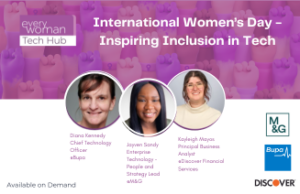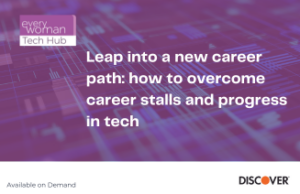
Grace Lin joined Discover Financial Services as an intern in summer 2022 and after finishing her degree returned to take up a place on the company’s Graduate Programme as a software engineer in the Digital Payments team. Entering the workforce in a hybrid working environment, she is at the start of both her career and a work revolution. She discusses the opportunities and the pitfalls of hybrid working as a new starter, and why, as an introvert, she values the benefits of both home and work environments.
What expectations did you have around entering the workplace as a new starter in a hybrid work landscape?
My internship was remote because it happened in the pandemic year, but since joining the Graduate Programme in September, I’ve been a hybrid worker — in the office three days a week and working from home the other two days. I worked full-time in an office in my gap year, between school and university, so even though I am early in my career I have experienced both. The biggest difference with hybrid is undoubtedly the relative lack of commuting, because that takes a huge chunk of your day. You do have to set your boundaries though because it can be hard to differentiate between working hours and non-working hours and be firm with yourself about not touching the computer after five, for example, because it’s so tempting to just carry on working without a commute to break things up.
What opportunities has Discover provided to help new starters in the hybrid workplace?
Because of the pandemic, the company was used to remote working and obviously now that’s been adapted further. When we joined, we had an introductory week involving sessions with the Graduate Programme managers and networking, where we had opportunities to meet other people from around the company. In terms of hybrid working, we had sessions on how to connect with line managers and I have a weekly one-to-one with my manager, and have also been set up with peer advisors — graduates in the year above who have already gone through the process who we can ask any questions we might have.
What opportunities does Discover offer in its Internships and Graduate Scheme?
The intern scheme offered me engagement with people from different areas, roles and levels and the chance to develop both tech and soft skills by working on a well-defined project, as well as networking opportunities through social events. On the graduate programme you get to spend three months at Discover’s Chicago headquarters in your second year, which is a great way to find out what the company is all about — and being an international company it’s important to get that opportunity to interact with people from all around the world. Discover invests a lot in its people and people at Discover are very open minded — that’s one of the defining traits of the business. We have the use of Development Central and Discover Tech Academy, both free resources, so you can upskill yourself during your downtime with courses. You can also always reach out to anyone in a role that you want to be in and ask them to tell you more about it. I’m on my first rotation in Digital Payments and the next rotation will be in a different department. We don’t get to choose our rotations, but we do get to state our preferences. At Discover, I can explore career paths, and that was something that was important to me when I was choosing a graduate programme. When I was at university, I did an industrial placement at Vodafone and that was more of a project management internship, and from that I knew that I ultimately wanted to be in a more technical role. But I am open to being surprised too because there are so many different roles.
Is face-to-face culture for a new starter important and how do you negotiate that in hybrid working?
Being in the office full-time is definitely more suited to people who are extroverted, because you can get tired from having to be on 24/7. Now, however, you don’t have to have your camera on if you’re not feeling it and that’s nice if you’re introverted, as I am. For me, hybrid working is great because you still get to have those in-person interactions, which are so important; you just don’t have to do it every single day. Visibility is important as a new starter, and when working hybrid it can be easy to disappear behind a screen or just not build up your presence, so it’s important to put yourself out there to meet new people and build your network. Obviously, part of that is through the work you do, but another part is in attending office events in person and being seen around the office. Discover is great at creating opportunities for people to be in the office outside of work, from monthly drinks to team building events. I’ve also enjoyed getting involved with the Women in Tech community which was a great way for me to increase my visibility, and the Lean Coffee sessions, where we go in and discuss different topics. Those events are also hybrid so even if I wasn’t in the office, I’d be able to join on Teams.
Does hybrid offer a perfect work-life balance — would you change anything about it?
Because hybrid is so flexible, it’s suitable for everyone; I have co-workers who are in the office every day of the week because they prefer working away from home distractions, or they just like having that office space to go to. But I also have colleagues who are completely remote due to location, for example. And then there are people who come in once a week because they like being able to align with their team in person but prefer to work at home or maybe have other commitments such as a school run. I tended to be drained when I was in an office full-time, but now I look forward to going in because it’s a chance to catch up with people. I’ve learned a lot about my preferences for work-life balance over the past three months, and also that creating relationships is so much easier in person. But I do think that sometimes I’m more productive at home, because in the office you see your work friends and chat, whereas at home you’re more mindful of who you’re talking to, and it will usually be for work purposes.
How important is a strong DE&I culture in a hybrid environment?
It has always been important to me in any environment. I try to advocate for inclusivity in the workplace in my chosen career path as a woman and a software engineer, but also as a second-generation Chinese immigrant, encouraging others who are from a similar background in similar spaces. It’s so important that everyone feels comfortable enough to bring their authentic self to work, and that’s not just about differences being recognised but about addressing those differences as well. Discover is very big on DE&I. We have a partnership with Tech We Can which is an organisation that helps to educate young children, and particularly girls, about careers in tech and the company also does a lot of unconscious bias training, which is important for managers. I don’t think most people have the intention to harm others, but there are times when you can unconsciously upset someone. The company also works a lot on external impact with partners such as everywoman and that inclusive culture really shows. On my internship, I remember looking at the workforce and seeing different people in the room, not a homogenous group, and that made a real impact on me.
What would you say to other new starters about hybrid working?
Explore what works best for you, be open to changes and know your boundaries. Hybrid working can give you a good work-life balance, but it can take a bit of time to find that ‘right balance’. When you’re working in a hybrid environment it’s important to be conscious of how you spend your time with co-workers, making sure that when you are in the office, meetings have clear purposes and outcomes. And working from home, it’s important to have a dedicated workspace as it can really help with that separation between work and your own time. Setting expectations, both yours and other people’s, around things like messaging and whether people are expecting an instant reply, or whether cameras are on or off when video conferencing is something that you have to be conscious about figuring out and communicating. For me, the most important thing around hybrid working though is that workplaces create reasons to go to the office other than just work, such as lunches or events because that really encourages people to feel part of the team. Workplaces need to be proactive about that, but if you don’t see those events, then create them yourself — message people to see if they want to go to lunch, start a running group or a board games group. It’s an exciting time to be a new starter; we are all looking at a new way of working and we’re all part of creating it.
To find out more about Discover’s careers page: jobs.discover.com/our-opportunities/students-and-graduates



